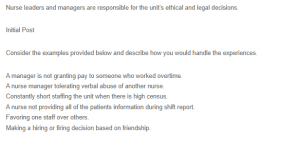Discussion – Ethical Decision-Making in Nursing Leadership
Ethical dilemmas in nursing management require careful consideration and adherence to ethical principles and professional standards. This paper examines several scenarios where ethical principles are at risk, offering solutions grounded in ethical leadership and legal frameworks.
Unpaid Overtime
All employees are entitled to overtime pay, and a manager who denies this goes against the law and ethics. As such, I would review the organizational policies and procedures as well as the legal employment practices. If the manager is in violation, then the conversation will be about legal and moral compliance, and subsequent measures to rectify the situation must take place (Haddad & Geiger, 2023).
Tolerating Verbal Abuse
It is important to point out that bullying in the form of verbal aggression, specifically in organizations, is not acceptable and has negative effects. Creating a positive work environment means that, as a nurse leader, employees should not be subjected to rude behavior by other employees. If faced with such a situation, I would demonstrate appropriate intervention by reporting the incident and standing with the victim by reporting the issue to the appropriate authorities, leading to disciplinary action being taken against the malefactor, depending on the gravity of the case.
Understaffing During High Census
Chronic understaffing, especially during high census periods, can jeopardize patient safety and staff well-being. Addressing this would involve advocating for adequate staffing by presenting data on patient outcomes and staff burnout rates to higher management and exploring temporary solutions such as hiring agency nurses (Varkey, 2020).
Incomplete Shift Reporting
Incomplete shift reporting can lead to errors in patient care. To combat this, I would emphasize the importance of comprehensive communication through training and perhaps introduce a standardized handoff tool that includes checklists to ensure all critical patient information is conveyed.
Favoritism among Staff
Favoritism can demoralize staff and affect team dynamics. I would ensure transparent and fair management practices are in place. This might involve revising evaluation and reward systems to be objective and implementing regular feedback sessions to address any concerns of bias.
Biased Hiring or Firing Decisions
Decisions based on personal relationships rather than merit or performance undermine team integrity and effectiveness. I would review hiring and firing practices to ensure they are based on clear, measurable criteria and involve multiple stakeholders in these decisions to reduce bias.
Conclusion
Professional and ethical leadership is crucial in the management of nursing. Healthcare professionals must act in a proper and ethically/morally right manner while practicing the correct legal process. Ethical issues should, therefore, be faced ahead of time and resolved systematically to foster harmony, productivity, and legal compliance in workplaces.
References
Haddad, L. M., & Geiger, R. A. (2023). Nursing ethical considerations. National Library of Medicine; StatPearls Publishing. https://www.ncbi.nlm.nih.gov/books/NBK526054/
Varkey, B. (2020). Principles of clinical ethics and their application to practice. Medical Principles and Practice, 30(1), 17–28. https://doi.org/10.1159/000509119
ORDER A PLAGIARISM-FREE PAPER HERE
We’ll write everything from scratch
Question 
Nurse leaders and managers are responsible for the unit’s ethical and legal decisions.
Initial Post

Discussion – Ethical Decision-Making in Nursing Leadership
Consider the examples provided below and describe how you would handle the experiences.
A manager is not granting pay to someone who worked overtime.
A nurse manager tolerating verbal abuse of another nurse.
Constantly short staffing the unit when there is high census.
A nurse not providing all of the patients information during shift report.
Favoring one staff over others.
Making a hiring or firing decision based on friendship.
